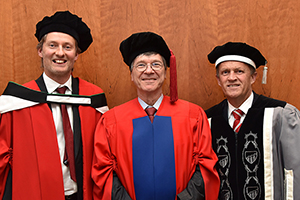Latest News Archive
Please select Category, Year, and then Month to display items
25 May 2022
|
Story Alicia Pienaar

The Dean of the Faculty of the Humanities, Prof Heidi Hudson, has the pleasure of inviting you to the inaugural lecture of Prof Paul Fouché in the Department of Psychology.
Event details:
Date: Wednesday 1 June 2022
Time: 17:30 SAST
Venue: Equitas Auditorium, UFS Bloemfontein Campus
RSVP before or on 27 May 2022 to Anneke Diesel, +27 51 401 9314 or email denobilia@ufs.ac.za
Subject:
Understanding Greatness: Dissecting the eminent personality from a psychobiographical approach
About the Speaker:
Paul Fouché has been employed at the UFS since 2007. Currently, he is a professor and a registered counselling psychologist with the HPCSA and an active member of the Psychological Society of South Africa. He is also an NRF C-rated researcher. As research supervisor/co-supervisor, he has graduated 115 postgraduate students.
He served on the editorial committee of Acta Academica, was guest editor of the Journal of Psychology in Africa, and co-editor of special issues on psychobiography for Europe’s Journal of Psychology and two books by Springer. Paul is the
coordinator of the BPsych Honours programme and lectures in the Applied Master’s programme.
Academic credentials:
PhD: 1999, Psychobiography, Nelson Mandela University, South Africa
MSocSc cum laude: 1993, Counselling Psychology, University of the Free State, Bloemfontein, South Africa
BSocSc Honours cum laude: 1990, Psychology, University of the Free State, Bloemfontein, South Africa
BSocSc: 1989, Psychology, University of the Free State, Bloemfontein, South Africa
Prof Jeffrey Sachs presented with honorary doctorate at Spring Graduation Ceremony
2015-10-01

Prof Jeffrey Sachs (centre) with Prof Philippe Burger,
Head of Department: Economics (left), and
Prof HJ Kroukamp, Dean of the Faculty of Economic and
Management Sciences (right).
Photo: Charl Devenish |
“Quality education is the best accelerator for sustainable growth. Universities have a unique role to play in this regard,” Prof Jeffrey Sachs said during a lecture he presented at the University of the Free State (UFS) Faculty of Economic and Management Sciences. He gave an insightful overview of the new Sustainable Development Goals (SDGs) of the United Nations. The 17 SDGs replace the Millennium Development goals of the past 15 years. In a major achievement, 193 countries will sign the goals at the United Nations (UN) in New York on 25 September 2015.
Prof Sachs is the director of The Earth Institute, Quetelet professor of Sustainable Development, and professor of Health Policy and Management at Columbia University. He is also a special advisor to the UN Secretary-General Ban Ki-moon on the Millennium Development Goals, and director of the UN Sustainable Development Solutions Network. Another accolade now added to his résumé is an honorary doctorate in Economics conferred on him by the UFS at the Spring Graduation Ceremony on 17 September 2015 for outstanding achievements and contribution to academia.
“South Africa is not achieving sustainable development. It has the highest inequality in the world with high unemployment among the youth. Quality education is the best accelerator for growth,” Prof Sachs said. He used the high education investment in Korea as an example of that country’s growth. Prof Sachs added that the government cannot achieve the SDGs on its own. “It is important for the country and universities to take on the goals. Universities can apply pressure, influence and provide solutions.”